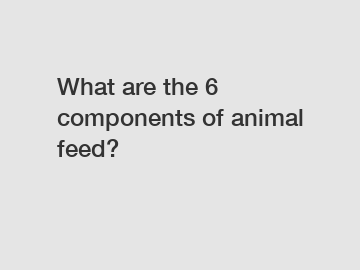What are the 6 components of animal feed?
The six components of animal feed are carbohydrates, proteins, fats, vitamins, minerals, and water. These components are essential for providing animals with the nutrients they need to maintain good health and support their growth and development. In this article, we will explore the importance of each component and the impact it has on animal nutrition.
Carbohydrates are the main source of energy in animal feed. They are found in grains, such as corn, wheat, and barley, as well as in root vegetables, like potatoes and carrots. Carbohydrates are broken down into glucose during digestion and serve as a fuel for the body. They provide energy for activities, such as movement and reproduction, and support the growth and maintenance of tissues.
Proteins are essential for the growth, repair, and maintenance of tissues in animals. They are made up of amino acids, which are the building blocks of proteins. Animal sources of protein, such as meat, fish, and dairy products, are considered complete proteins because they contain all the essential amino acids. Plant-based sources of protein, like soybeans and peas, may be incomplete proteins and need to be combined with other plant-based sources to provide all the necessary amino acids.

Fats, also known as lipids, are concentrated sources of energy in animal feed. They provide more energy per gram compared to carbohydrates and proteins. Fats are important for the absorption and transportation of fat-soluble vitamins, as well as for the insulation and protection of vital organs. They also contribute to the flavor and palatability of feed, making it more appealing to animals.
Vitamins are essential organic compounds that animals require in small amounts to support various physiological functions. They play a crucial role in the metabolism of nutrients and the production of energy. Vitamins can be classified into two categories: fat-soluble vitamins (A, D, E, and K) and water-soluble vitamins (B-complex vitamins and vitamin C). Each vitamin has specific functions and deficiencies can lead to various health disorders.
Minerals are inorganic substances that animals need in small quantities for proper growth and maintenance of tissues. They are involved in processes such as bone formation, muscle contraction, nerve function, and hormone synthesis. Minerals can be divided into two groups: macro-minerals, which are required in larger amounts (e.g., calcium, phosphorus, and magnesium), and trace minerals, which are required in smaller amounts (e.g., iron, zinc, and copper).
Water is often overlooked but is one of the most important components of animal feed. It is involved in almost all physiological processes, including digestion, nutrient absorption, and waste elimination. Water acts as a solvent, transport medium, and temperature regulator in the body. Animals need a constant supply of clean and fresh water to maintain hydration and overall health.
In conclusion, the six components of animal feed - carbohydrates, proteins, fats, vitamins, minerals, and water - are essential for providing animals with the necessary nutrients for growth, development, and overall well-being. Each component plays a specific role in supporting various physiological functions, and their proper balance is crucial for maximizing animal performance and productivity. By understanding and meeting the nutritional needs of animals, we can ensure their welfare and contribute to sustainable and efficient agricultural practices.
Want more information on cylinder precleaner, feed pellet coating machine, animal feed conditioner manufacturer? Feel free to contact us.

Comments